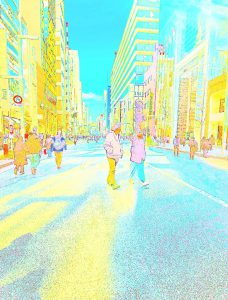提言:高齢者の免許返納政策における課題と解決策――自由と安全の調和を目指して
- 2025.01.28
- 月刊芳美
提言:高齢者の免許返納政策における課題と解決策――自由と安全の調和を目指して
序論
高齢者による免許返納政策は、交通事故の抑止と社会的安全の確保を目的とした重要な取り組みである。しかし、その政策運用においては、返納を促す側面に重きが置かれる一方で、返納後の高齢者の生活の質(Quality of Life: QoL)の確保や、社会的公平性への配慮が十分とは言えない。特に、免許返納が家族や社会全体に責任を転嫁する形で進められる構図や、当事者の自尊心や権利が損なわれる状況に対しては批判が多い。
本提言では、現行政策の課題を検討しつつ、高齢者の移動の自由と社会全体の安全を両立させるための具体的な解決策を提示する。
現行政策の課題
1. 返納後の生活支援の欠如
免許を返納した高齢者に対して、公共交通や代替手段の提供が不十分であるため、生活の質が大きく低下する事例が散見される。特に地方部では、車が移動の必須手段であり、返納後の支援がないことは社会的孤立や心理的負担を助長している。
2. 家族や社会への責任転嫁
高齢者の免許返納は、しばしば「家族が移動をサポートする」という前提のもと進められる。しかし、実際には家族による送迎が行われず、高齢者が「返納しなければよかった」と後悔するケースが多い。この構図は、政策が家族に過剰な責任を負わせると同時に、当事者の選択肢を奪う結果を生んでいる。
3. 社会的圧力と自己決定権の損失
返納を促進する風潮が社会全体で強まる中、高齢者は家族や周囲からの同調圧力を感じやすくなっている。結果として、運転能力に問題がない場合でも返納を余儀なくされるケースが発生し、自己決定権や自尊心の損失につながっている。
4. 若者の免許離れと意識改革の欠如
一方で、若年層における運転免許取得率の低下や、交通ルールを軽視する無免許者の増加が懸念される。これにより、交通ルールへの配慮や他者への思いやりといった意識が希薄化している。
提言:解決策と新たなアプローチ
1. 返納後の支援策強化
返納した高齢者に対して、以下のような支援を国の責任として提供すべきである:
電動カートや電動自転車の無償支給:高齢者の移動手段を確保し、日常生活の不便を最小化する。
公共交通インフラの整備:地方部ではコミュニティバスや乗り合いタクシーの導入を進め、都市部では高齢者割引を拡充する。
2. 再取得支援と柔軟な免許制度
一度免許を返納した高齢者が再び取得を希望する場合、国の負担で再取得を支援する制度を導入すべきである。また、高齢者向けに運転範囲を限定した「限定免許制度」を設けることで、能力に応じた安全運転を可能とする柔軟な仕組みを整える。
3. 家族や若年層への免許取得支援
高齢者支援の一環として、親族3親等以内の家族に免許取得を義務化し、国が費用を全額負担する制度を導入する。この措置により、若者の免許取得率を向上させるとともに、高齢者の移動支援を家族が現実的に担える環境を構築する。
4. 全国民の免許取得義務化
全国民に運転免許の取得を義務付け、国が費用を全額負担することで、以下の効果を期待できる:
交通ルールへの意識改革:全員が運転者の視点を持つことで、交通ルールの遵守意識や他者への配慮が醸成される。
自動車産業の活性化:免許取得率の向上により、自動車産業や関連産業への経済的波及効果が期待できる。
5. 返納者への金銭的補償
免許を返納した高齢者に対して、一律100万円程度の金銭補償を行うことを提案する。これは、免許返納を事実上の「国家資格の剥奪」と捉えた場合の合理的な代償であり、高齢者の生活の質を尊重する政策として正当性を持つ。
結論
高齢者の免許返納政策を進めるにあたっては、安全性の向上だけでなく、高齢者の生活の質や社会的公平性を確保する視点が不可欠である。本提言で示したような柔軟かつ包括的な政策を通じて、返納後の支援強化や免許再取得の支援を行い、高齢者の尊厳と社会全体の調和を両立させることが求められる。また、全国民への免許取得義務化や若年層への支援を通じて、交通産業の活性化や意識改革を促進することが、日本の交通政策全体の発展につながると考える。
政府や自治体は、これらの提言を真摯に受け止め、高齢者を取り巻く政策の課題解決に向けて、迅速かつ大胆な取り組みを進めるべきである。
参考文献
https://uhyou.com/menkyohennoutosekainokoureidoraiba-.html?utm_source=chatgpt.com
https://president.jp/articles/-/88433
https://mag.moov.co.jp/1138/
https://www.qsha-oh.com/historia/article/returning-license-overseas/
https://merkmal-biz.jp/post/33326
https://koumu.in/articles/220616a
https://searchkoreanews.jp/life_topic/id%3D29184
https://clicccar.com/2022/01/25/1156650/
https://news.livedoor.com/lite/article_detail/19280893/
https://uhyou.com/menkyohennoutosekainokoureidoraiba-.html
https://uhyou.com/menkyohennou-kokunaigainoseidotoshi.html
https://uhyou.com/menkyohennoutokaigainokoureishadora.html
https://uhyou.com/menkyohennoutohouritsunohensenyakou.html
https://www.irric.co.jp/topics/press/2021/0927_02.php
💕
Proposal: Addressing Challenges in Elderly Driver’s License Return Policies – Striking a Balance Between Freedom and Safety
Introduction
Policies encouraging elderly drivers to return their licenses aim to reduce traffic accidents and ensure societal safety. However, current implementation often focuses on promoting license return, with insufficient attention paid to safeguarding the quality of life (QoL) of elderly individuals after they relinquish their licenses. Furthermore, the policy framework tends to shift responsibilities onto families and society, while neglecting to address the human rights and dignity of the elderly.
This proposal examines the shortcomings of current policies and presents actionable solutions to balance elderly individuals’ mobility rights with broader public safety concerns.
Challenges in Current Policies
1. Lack of Support After License Return
Elderly individuals who return their licenses frequently face significant declines in their QoL due to insufficient alternative transportation options. This issue is particularly acute in rural areas, where driving is often indispensable for daily life.
2. Shifting Responsibilities to Families and Society
The existing framework assumes that families will provide transportation support for elderly members after they return their licenses. However, in practice, many families fail to meet this responsibility, leaving the elderly regretting their decision to return their licenses. This dynamic places an undue burden on families while stripping the elderly of their mobility and independence.
3. Social Pressure and Loss of Autonomy
The increasing societal pressure to return licenses leads to situations where elderly individuals feel coerced into doing so, even if they are still capable of driving safely. This undermines their autonomy, dignity, and right to make decisions regarding their own lives.
4. Declining License Acquisition Among Young People
Simultaneously, a decline in driver’s license acquisition among younger generations has been observed. This trend, coupled with a lack of awareness about traffic laws among non-drivers, contributes to a broader erosion of road safety and social responsibility.
Proposed Solutions and New Approaches
1. Enhanced Post-Return Support
The government must take responsibility for ensuring that elderly individuals who return their licenses have access to adequate transportation options:
Provision of electric carts or bicycles free of charge: This would ensure that elderly individuals can maintain their mobility and independence.
Improved public transportation infrastructure: Community buses and ride-sharing services should be expanded in rural areas, while urban areas should introduce greater discounts for elderly commuters.
2. License Reacquisition Support and Flexible Licensing Systems
Elderly individuals who wish to reacquire their licenses after returning them should be provided with government-funded support. Additionally, a “restricted license system” tailored to elderly drivers—limiting driving to specific times or areas—should be introduced to enable safer, more flexible driving options.
3. Mandatory License Acquisition for Family Members and Young Adults
To support elderly individuals, the government should mandate that family members within three degrees of kinship acquire driver’s licenses, with the costs covered by the state. This initiative would not only improve support for elderly family members but also address the declining rate of license acquisition among younger generations.
4. Nationwide Mandatory License Acquisition
Introducing mandatory driver’s license acquisition for all citizens, with costs fully covered by the government, would yield several benefits:
Raising awareness of traffic laws: Encouraging all citizens to view traffic rules from a driver’s perspective would foster greater road safety and mutual respect among road users.
Boosting the automotive industry: Increased license acquisition rates would stimulate economic growth in the automotive and related industries.
5. Financial Compensation for License Return
Elderly individuals who return their licenses should receive financial compensation, such as a one-time payment of 1 million yen. This approach would recognize license return as a form of “state-mandated forfeiture of qualification” and provide fair recompense, thereby aligning with the principles of a democratic society.
Conclusion
Elderly driver’s license return policies must prioritize not only safety but also the QoL and dignity of the affected individuals. The proposed solutions—enhanced post-return support, license reacquisition assistance, family and youth support measures, mandatory nationwide license acquisition, and financial compensation—would address the shortcomings of current policies and foster a more balanced, inclusive approach.
By implementing these measures, the government could alleviate the burden on elderly individuals, enhance public safety, and stimulate economic and societal benefits, thereby advancing Japan’s traffic policy as a whole.
The government and local authorities should act promptly and decisively to address these pressing issues, ensuring that the voices of the elderly are heard and their rights are preserved.
References
https://uhyou.com/menkyohennoutosekainokoureidoraiba-.html?utm_source=chatgpt.com
https://president.jp/articles/-/88433
https://mag.moov.co.jp/1138/
https://www.qsha-oh.com/historia/article/returning-license-overseas/
https://merkmal-biz.jp/post/33326
https://koumu.in/articles/220616a
https://searchkoreanews.jp/life_topic/id%3D29184
https://clicccar.com/2022/01/25/1156650/
https://news.livedoor.com/lite/article_detail/19280893/
https://uhyou.com/menkyohennoutosekainokoureidoraiba-.html
https://uhyou.com/menkyohennou-kokunaigainoseidotoshi.html
https://uhyou.com/menkyohennoutokaigainokoureishadora.html
https://uhyou.com/menkyohennoutohouritsunohensenyakou.html
https://www.irric.co.jp/topics/press/2021/0927_02.php
